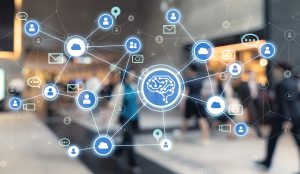The Role of AI in Personalized Marketing: Revolutionizing Customer Engagement
In today’s digital age, artificial intelligence (AI) is transforming industries across the globe, and marketing is no exception. One of the most significant shifts in modern marketing is the ability to deliver personalized experiences to individual customers. Thanks to AI, businesses now have the tools to understand their customers more deeply, predict their behavior, and tailor products, content, and communication in ways that were once unimaginable. AI-driven personalized marketing is not just a trend but a powerful approach that is reshaping how brands connect with their audiences.
This article explores the role of AI in personalized marketing, how it works, and the many benefits it offers to businesses and customers alike. Along with examples of how leading companies use AI for personalized marketing, we’ll also discuss the challenges, ethical considerations, and what the future holds for AI-powered marketing strategies.
What is Personalized Marketing?
Before we dive into the specifics of AI’s role, let’s first define personalized marketing. Simply put, personalized marketing refers to the use of data to deliver targeted, relevant content, messages, and offers to customers based on their preferences, behavior, and demographic characteristics. Unlike traditional marketing, which typically relies on broad, generalized messaging, personalized marketing seeks to create unique experiences for each individual, making it more effective in engaging consumers and driving conversions.
How AI Powers Personalized Marketing

Artificial intelligence is revolutionizing personalized marketing by enabling brands to gather and analyze vast amounts of customer data in real time. By leveraging AI tools and machine learning algorithms, businesses can gain deep insights into customer behavior, anticipate needs, and automate the delivery of personalized experiences. Let’s take a closer look at the various ways AI is making personalized marketing more powerful and effective.
1. Data-Driven Insights for Better Targeting
One of the most significant advantages of AI in personalized marketing is its ability to analyze large volumes of data and uncover patterns that humans might overlook. AI can process data from multiple sources, such as customer interactions, browsing history, past purchases, and even social media activity. This allows businesses to create highly targeted and relevant marketing messages that speak directly to individual customer needs.
For instance, online retailers like Amazon use AI to track a customer’s browsing history and suggest products that they are likely to be interested in. By analyzing past buying behavior, AI can recommend similar items or even alert customers about promotions for products they’ve previously viewed. This type of data-driven targeting is not only more efficient but also helps to build a stronger connection with customers.
2. Personalized Content Recommendations
AI-driven recommendation engines have become an integral part of many digital platforms. Companies like Netflix, Spotify, and YouTube use AI to suggest content based on individual user preferences, ensuring that the customer’s experience feels tailored and unique. These platforms analyze user behavior—such as what shows, movies, or songs are watched or listened to—and recommend content accordingly.
In marketing, personalized content recommendations are often used to deliver dynamic, relevant messages to customers. For example, AI can customize email campaigns by recommending products based on previous purchases or browsing activity. The key is that AI allows for continuous optimization of recommendations based on real-time data, ensuring that customers receive the most relevant content at any given time.
3. Chatbots and Virtual Assistants
AI-powered chatbots and virtual assistants are playing an increasingly important role in personalized marketing. These AI-driven tools can engage customers in real time, answer questions, and recommend products or services based on the customer’s previous interactions and preferences. Chatbots are available 24/7, providing immediate assistance, which helps brands offer a more personalized and responsive customer experience.
For example, many online retailers use chatbots to recommend products while customers are browsing their websites. A chatbot might ask questions about style preferences or size and then suggest items based on the customer’s responses. Over time, these chatbots learn from customer interactions, becoming smarter and offering increasingly personalized recommendations.
4. Predictive Analytics for Customer Behavior
AI also enables predictive analytics, allowing businesses to anticipate customer needs before they arise. By analyzing historical data, AI can identify trends and make predictions about what products or services a customer might be interested in next. This predictive capability is extremely valuable for personalizing marketing efforts and boosting customer retention.
For example, an online store might use predictive analytics to send personalized offers to customers just before they’re likely to make a purchase. If a customer frequently buys a particular type of clothing every season, AI can send them a tailored promotion for the upcoming season’s styles, increasing the likelihood of a sale. AI helps marketers to move from reactive to proactive, addressing customer needs before they even express them.
5. Dynamic Pricing and Promotions

AI can optimize pricing strategies by analyzing customer behavior and market conditions in real time. By using AI-powered dynamic pricing, businesses can adjust their prices based on demand, competition, and even customer willingness to pay. This ensures that prices are always competitive and relevant, enhancing the customer experience.
For example, airlines and hotels often use dynamic pricing to adjust rates based on factors such as time of booking, availability, and customer loyalty. Similarly, e-commerce businesses can offer personalized discounts or promotions to customers based on their shopping habits. If a customer frequently browses a particular category of products but hasn’t yet made a purchase, AI can offer a limited-time discount to encourage conversion.
6. Enhanced Email Marketing Campaigns
Email marketing remains one of the most effective tools in a marketer’s arsenal. However, sending generic emails to large lists of customers is no longer enough. AI can help marketers send personalized emails that cater to the unique preferences of each recipient.
For example, AI can optimize the timing of email campaigns, determining when each customer is most likely to open and engage with an email. AI can also personalize subject lines, content, and offers based on a customer’s previous interactions with the brand. This level of personalization can lead to higher open rates, click-through rates, and conversions.
7. Sentiment Analysis and Social Listening
AI-powered sentiment analysis allows businesses to understand how customers feel about their brand, products, or services. By monitoring social media, customer reviews, and other online interactions, AI can determine whether customer sentiment is positive, negative, or neutral. This helps brands adjust their messaging and marketing strategies to better align with customer emotions and expectations.
For example, if a customer expresses dissatisfaction with a product on social media, AI can flag the issue for a customer service representative to address quickly. Alternatively, AI can detect positive sentiment and encourage the brand to share customer testimonials or reviews in marketing materials.
8. Automation of Marketing Tasks
AI also allows for the automation of many marketing tasks that would otherwise be time-consuming and manual. With AI, businesses can automate customer segmentation, campaign management, and content delivery. This helps marketers scale their efforts and deliver hyper-targeted campaigns without needing to manually adjust each element.
For example, AI can segment email lists based on factors like purchase history or browsing behavior and send tailored messages to each segment. Similarly, AI can automatically adjust ad campaigns across various channels to ensure that the most relevant content is shown to the right audience at the right time.
Benefits of AI in Personalized Marketing
The integration of AI into personalized marketing offers numerous benefits for both businesses and consumers.
Improved Customer Engagement
Personalized marketing helps brands create more relevant and engaging experiences for their customers. When customers receive content and offers tailored to their interests and needs, they are more likely to engage with the brand and make a purchase.
Higher Conversion Rates
By delivering personalized experiences, AI can increase the likelihood of conversion. Whether it’s through product recommendations, personalized discounts, or tailored content, AI ensures that marketing messages resonate with customers on a deeper level, leading to higher conversion rates.
Cost Efficiency
AI can automate many aspects of personalized marketing, reducing the need for manual intervention and improving overall efficiency. By streamlining processes like customer segmentation, email delivery, and content creation, AI helps businesses save time and money while still delivering highly targeted campaigns.
Stronger Customer Loyalty
When customers feel that a brand understands their preferences and offers personalized experiences, they are more likely to remain loyal. AI allows businesses to build stronger relationships with customers, leading to increased customer retention and repeat business.
Challenges and Ethical Considerations
Despite its many advantages, the use of AI in personalized marketing also raises some challenges and ethical concerns.
Data Privacy
One of the main concerns surrounding AI-powered personalized marketing is data privacy. AI requires large amounts of customer data to deliver personalized experiences, and consumers may be wary of how their data is being used. Businesses must ensure that they are collecting and using customer data in compliance with data protection laws like GDPR and CCPA.
Bias and Fairness
AI algorithms can sometimes be biased, leading to unfair targeting or discrimination. For example, an AI system might unintentionally prioritize certain demographic groups over others, leading to unequal treatment. Marketers must ensure that their AI systems are regularly audited and adjusted to prevent biases from creeping in.
The Future of AI in Personalized Marketing
The future of AI in personalized marketing is bright. As AI technology continues to evolve, marketers will have even more powerful tools at their disposal to create hyper-personalized experiences. Emerging technologies like natural language processing (NLP), augmented reality (AR), and voice recognition are poised to take personalized marketing to the next level.
In the future, we can expect even more sophisticated AI-driven marketing strategies that seamlessly integrate with emerging technologies to create truly immersive and personalized customer experiences.
Conclusion
In conclusion, AI is playing a pivotal role in transforming personalized marketing. From data-driven insights to dynamic content recommendations, AI enables brands to deliver more engaging, relevant, and effective marketing strategies. While challenges like data privacy and algorithmic bias must be carefully managed, the benefits of AI in marketing are undeniable. As AI technology continues to evolve, it will only enhance the ability of businesses to create more personalized, engaging, and impactful marketing experiences for their customers.
FAQs About AI in Personalized Marketing
1. How does AI personalize marketing campaigns?
AI personalizes marketing campaigns by analyzing customer data, such as browsing history, purchase behavior, and preferences. Based on this data, AI can deliver targeted content, product recommendations, and offers that are more likely to resonate with individual customers.
2. Is AI expensive for small businesses to implement?
While AI tools can be costly, there are many affordable options available for small businesses. Cloud-based platforms and SaaS solutions provide small businesses with access to AI-driven marketing tools without the need for significant upfront investment.
3. How does AI improve customer experience?
AI improves customer experience by delivering personalized, relevant content and recommendations based on customer behavior and preferences. AI can also automate tasks like chat responses and product recommendations, ensuring that customers receive timely and personalized service.
4. Can AI increase marketing ROI?
Yes, AI can significantly increase marketing ROI by improving targeting, optimizing campaigns, and automating repetitive tasks. AI enables marketers to focus their efforts on high-impact activities, leading to better results and more efficient use of resources.
5. Is data privacy a concern with AI in personalized marketing?
Yes, data privacy is a major concern. Businesses must ensure they are collecting and using customer data in compliance with privacy laws and regulations. Ethical use of AI requires transparency and accountability in how customer data is handled.




